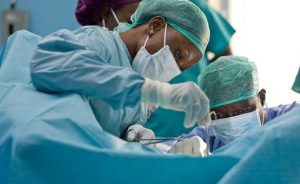774,000 Jobs: PDP Rejects Scheme, Says It Is Politically Motivated

The Peoples Democratic Party (PDP) Caucus in the House of Representatives has rejected the 774,000 jobs from the Special Public Works Programme of the President Muhammadu Buhari administration.
The party, in a statement by the leader of the Caucus, Rep. Kingsley Chinda dissociated itself from the scheme, describing it as politically motivated.
He accused the APC-led government of misusing Nigeria’s scarce resources with the intention to expend N52 Billion under the guise of “creating employment” for only three months.”
Read Full Statement Below:
The PDP Caucus in the House of Representatives has unequivocally rejected and dissociated itself from the Special Public Works Programme of the Buhari led APC Administration.
The caucus signed by its Chairman Kingsley Chinda (PDP Rivers) is strongly admonishing its members to ignore the letters written to Senators and House of Representatives members by APC State Coordinators of the National Directorate of Employment (NDE) on behalf of the Minister of State (Labour and Employment), asking for the nominate of 30 and 25 individuals respectively from each Local Government Area in their constituency.
The statement reads ” The Caucus considers this correspondence – a condemnable attempt to bribe and hoodwink the institution of the National Assembly into complicity in the misapplication of Nigeria’s scarce resources for the implementation of a questionable, misguided, absurd and arguably unlawful scheme that alarmingly intends to expend N52 Billion under the guise of “creating employment” for only three months.”
“This regrettably is the most unsustainable employment scheme implemented by any government”
“While the caucus espouses the eradication of poverty and the creation of gainful and sustainable employment for the burgeoning population of unemployed Nigerians under this administration, it flies in the face of reason and common sense why this government insists on expending enormous resources for the implementation of a politically motivated transient Programme, dubiously shrouded as “employment” having no empowering or enduring benefit to ordinary Nigerians especially when several viable and veritable job and wealth-creating alternatives exist for the application of the funds.”
Rep Chinda said “Elementary division of the approved Programme budget of N52billion by 774 LGA’S in Nigeria implies expenditure of N67.184million (about $150,000) in each LGA of Nigeria which if applied judiciously and transparently will suffice for the establishment of a Viable Industry in each LGA”
“He added that for several years to come will provide gainful, enduring and sustainable direct and indirect employment for more than 100 skilled and unskilled poor unemployed Nigerians per LGA and provide an invaluable opportunity for future growth, skill acquisition and economic development.”
“New International Labour Organization (ILO) data reveals that Micro, Small and Medium Enterprises (MSMES) account for a staggering 70% of employment worldwide, as they constitute more than 90% of enterprises in all developing countries of the world and in addition to creating employment, they are the engines of economic growth and social development contributing up to 70% of the GDP of all countries in the world (ILO 2019).”
” According to World Bank estimates, 600 million jobs will be needed by 2030 to absorb the growing global workforce, which makes SME development a high priority for many governments around the world (The World Bank 2020) and should ordinarily be of extreme priority to the Nigerian Government”.
“From the estimated sum of N67.184million intended to be expended in each LGA of Nigeria, N1million per SME can be utilized for the creation and development of 67 SME’S per LGA who will engage in viable and lucrative businesses in the Agriculture, mining and other value chains that in most instances would be peculiar to each individual LGA and create gainful employment for up to 3 or more poor Nigerians per SME.”
“Even in emerging markets and developed countries of the world, Micro Enterprises which are usually categorized as having less than 10 employees constitute between 75% to 95% of businesses in the country (OECD 2020, The Company Warehouse n.d.), it can very confidently be inferred that these enterprises probably constitute up to 99% of the businesses in Nigeria”.
The creation and development of 67 SMES in each LGA will provide at least 134 actual sustainable jobs per LGA and 103,716 nationwide. The impact on Nigeria’s economy and GDP will be astronomical and will set Nigeria on the path to economic growth and development. The gains to Nigerians and Nigeria’s socio-economic growth and development can be sustainable and enduring if the Nigerian government (Executive and Legislature) tackles the three cardinal challenges faced by SME’S which according to the International Labour Organization (ILO 2019) include Regulatory Environment.
Access to Finance and Skills shortages by instituting, amending or repealing legislation to avoid complex rules and regulations that impede SME growth, consistent provision of significant financial intervention to SME’S and adequately funding NDE, SMEDAN and other relevant government agencies to continuously provide sublime entrepreneurship training and skill acquisition.
This is common sense and not rocket science! The inability of the Buhari-led APC administration to conceptualize viable ideas for the expenditure of N52billion for the benefit of ordinary poor Nigerians as has been eloquently elucidated by the PDP Caucus of the House of Representatives emphasizes the dearth in cerebral capacity and acumen within the administration to proffer solutions to the myriad of issues bedevilling the nation and informs its inability in more than 5 years to record significant achievements in the administration’s focal campaign tripod of Security, Corruption and Economy.
The Minister of State (Labour and Employment) further bolstered this obvious deficiency when in an attempt to explain and defend the administrations reasons for initiating the Special Public Works Programme, during his speech on Thursday 28 May 2020 displayed alarming ignorance in erroneously likening the Programme to initiatives utilized by industrialized nations like the United States, during the Great Depression and later adopted by Colonial African and Asian countries to tackle poverty and spur economic recovery, growth and development (Premium Times 2020).
“While the concept behind the Buhari administration’s Special Public Works Programme appears to be similar, fundamental differences exist in the initiation, implementation and duration when compared to the innovative programmes utilized by industrialized nations during the great depression and similar initiatives by African and Asian nations as alluded to by the Honourable Minister.”
“These programmes were usually instituted by formal legislation creating dedicated sources of revenue for engagement of poor unskilled workers in the development of specific significant public infrastructure for an extended period for the benefit of current and future generations.”
“The remuneration of workers was either equal to or more than the related countries minimum wage (depending on skillset) with extensive opportunities for skill acquisition while responsibility for implementation of such programmes was domiciled with the heads of the relevant agencies.”
“On April 8, 1935, the US Congress approved the Emergency Relief Appropriation Bill which funded the Works Progress Administration (WPA) one of the agencies under the New Deal programmes created by President Franklin Roosevelt to relieve the economic hardship of the Great Depression, this National Works Program employed more than 8.5 million people on 1.4 million public projects before it was disbanded in 1943 after 8 years (as shown in the Library of Congress 2020, Wikipedia n.d.). Many famous American Landmarks like The Camp David Presidential Estate in Maryland were built under the WPA (Wikipedia n.d.). Similar Public Works Programmes in China (Elegant, S., Ramzy, A. 2009), India, Ethiopia and Rwanda (Zimmermann, 2020) and recent collaborations between ILO and several countries around the world are instituted by formal legislation with dedicated consistent funding, targeted at development of major public infrastructure for extended periods with extensive opportunities for skill acquisition and are either permanently part of the countries extant laws (like India) or have been in existence for decades (like China, Ethiopia and Rwanda).
” None of the countries mentioned by the Minister instituted Public works programmes for three months with no guaranteed consistent source of funding, no specific public infrastructure intended to be developed, no available opportunity for skill acquisition, no plan for implementation or coordination between MDA’S, no transparent identification of unskilled poor target population, politicisation of recruitment procedure and payment of remuneration less than the minimum wage of the country”
“The Buhari administration’s insistence that the Special Public Works Programme is an employment intensive scheme implies that the monthly stipend of N20,000 proposed by this administration as remuneration for target workers is a violation of the provisions of the National Minimum Wage Act 2019 enacted under this same administration which stipulates in Section 3(1-3) that every employer shall pay a minimum wage of not less than N30,000 to each worker every month, the minimum wage shall be the minimum total amount of money an employer of labour is required to pay the lowest-paid worker or employee monthly and any agreement for the payment of wages less than the national minimum wage are void.”
“The powers to grant exemptions conferred on the Minister of Labour and Employment in Section 4(2) of the act requires an order through the National Labour Advisory Council and published in the Federal Government Gazette taking into consideration reports from National Salaries, Incomes and Wages Commission or other such body that may make representation for such exemption”
“The PDP caucus is unaware of the constitution of the National Labour Advisory Council by this administration till date as is statutorily required and as was demanded for by the Nigerian Labour Congress (NLC) since 2018 or any subsisting order for exemption published in the Federal Government Gazzette which if in existence is another violation of the Act having not been issued through the National Labour Advisory Council. There is also no record of any report from the National Salaries, Incomes and Wages Commission or any other body making representation to the Minister for exemption from the provisions of the National Minimum Wages Act.”
” The President who endorsed the payment of N20,000 for implementation of this programme, the Minister who has hijacked and is superintending its implementation and the NDE’s Director General who is the agency’s accounting officer is in violation of extant provisions of the National Minimum Wages Act and should be sanctioned according to provisions of Section 9 of the Act. Ironically the Act never envisaged that the Minister who in Sections 11-13 is saddled with the enforcement and monitoring of the implementation of the Act would be its chief violator.”
“The probable illegality of this Programme is further emphasized by certain actions of the Minister of State Labour and Employment which appear to be in violation of the NDE Act. All powers bestowed on the Minister in the Act are clearly on the substantive Minister, the Minister of States assertion about being the supervising Minister of the NDE is alien to the Act, any internal policy’s or directives within the Ministry flowing from Nigeria’s flawed Ministerial appointment system cannot supersede provisions of formal legislation”
“The initiation and appropriation of funds for the Special Works Programme under the NDE and not the Ministry was based on the statutory mandate of the agency and confers responsibility for implementation on the agency. According to Section 20 of the Procurement Act, the NDE Director-General is the agency’s accounting officer and will be held accountable for the expenditure of funds appropriated for the agency”
” The NDE DG’S public outcry about being oblivious of the processes instituted by the Minister of State for implementation of the Programme indicts the Minister who in excising the implementation of this Programme from the Management of NDE has arrogated powers to himself not conferred on him by the NDE Act and prevented the DG from performing his statutory functions and assuming responsibility for the expenditure of funds allocated to his agency.”
“In his 28 May 2020 speech, the Minister of States reference to provisions of Section 16(1) as justifying his creation of Special Committees known as State Selection Committees across the 36 states of the federation and the FCT is flawed and at variance with that provision of the Act which indicates the substantive minister can from time to time constitute a Special Committee of the Directorate and not special committees”
“Considering the cost implication of the creation of this Special Committee as stipulated in Section 16(2) of the Act which allows the NDE Board to prescribe allowances payable to organizations and persons elected as members of the Special Committee of the Directorate, the Act does not suggest the creation of several committees across the 36 states which will unreasonably incur expenditure on behalf of the government”
“The skewed composition of members of the State Selection Committees in favour of APC members, political thugs and party stalwarts confirms the suspicion that these State Selection Committees are conduits for misappropriation of Nigeria’s Commonwealth for settlement of APC members and for the prosecution of a false employment narrative and façade”
“The PDP Caucus of the House of Representatives as members of the National Assembly do not exonerate themselves from responsibility in the approval of funds for implementation of the misguided Special Public Works Programme and unreservedly apologize to Nigerians for the planned misapplication of their scarce resources”
“The recent revelations from the House of Representatives probe of the NDDC, the surreptitious introduction and questionable consideration of the controversial Water Resources Bill; the attempt to railroad the House into the passage of the plagiarized Infectious Diseases Bill and the clandestine consideration and passage of the CAC Act are a few examples of the current dictatorial, biased and divisive modus operandi of the APC led 9th National Assembly were decisions are taken on behalf of members without their full knowledge or participation, issued hinging on statutory functions and privileges are concluded upon by individual members in leadership positions and were opposing views are unwelcome and stifled”.
“The Caucus has resolved to employ legislative and lawful processes including the institution of legal action were necessary to address any encroachment on the performance of our statutory functions and fundamental human rights.”
“The blatant and brazen disregard of a co-equal arm of government and elected representatives of the Nigerian people by the Minister of State who was grandstanding before the Nigerian people and the tacit approval of his actions by the President in authorizing his continued implementation of this skewed programme regardless of definite pronouncements by the National Assembly and apparent violations of legislation in this regard confirms the Buhari administration’s aversion to the Rule of law, constitutional provisions and institutions and disinterest in the wellbeing of the Nigerian people.”
“The ulterior motives of this administration in the implementation of this programme are obvious and no longer left to conjecture! This is an APC initiative intended to enrich APC stalwarts by creating opportunities to pilfer Nigeria’s resources under the guise of creating employment.”
“The intended allocation of slots to elected political officials as suggested by the Minister are as follows; Governors – 40, Senators – 30, House of Representatives Members – 25, Ministers – 50, House of Assembly Members – 20, Council Chairmen – 20, Religious organizations and organized bodies – 20, which gives a total of at most 205 in each LGA. What is the plan for engagement of the balance of about 795 individuals and how will ordinary Nigerians who are not stalwarts or members of the APC participate in this scheme when the State Selection Committees were selected by this APC administration and are composed of APC members?”
“Multiplication of N20,000 by 1000 persons in each of the 774 LGA’S of the country gives a total of N46.44billion as the actual amount to be utilized for the programme in three months leaving a balance of N5.56billion when deducted from the total approved sum of N52billion. Why is there a surplus of N5.56billion and what is this amount intended to be utilized for in three months when the CBN is supposed to make payments directly to the accounts of beneficiaries? ;
”
“Are the banks who are supposed to handle registration and collation of data of beneficiaries selected through a transparent process in line with extant laws of Nigeria or were they simply selected because they are cronies of the Minister of State and this administration? Is this administration admitting its inability to fight corruption and indicting its own agencies by inferring that transparency of the process can only be guaranteed through banks? ;
“Will the government be charged by the banks for the provision of services that should ordinarily be carried out by the relevant government agency? Are there really any public works identified to be maintained by 1000 persons in each LGA for three months when most LGA’S in Nigeria hardly have any infrastructure? The questions are innumerable!”
“This programme has obviously not been very well thought out and is destined for failure from the onset. It will, unfortunately, be a monumental waste of the nation’s resources and another sad footnote in the chequered history of the Buhari Administration! We admonish the government to jettison the planned three-month Special Public Works Programme for more sustainable alternatives that will utilize related funds to the benefit of Nigerians.”
“This is a defining moment for the APC leadership of the National Assembly whose inaction has elicited the appellation of a lame-duck legislature from the Nigerian populace who have lost faith in the ability of the 9th assembly to hold this administration accountable for their actions.”
“The only path to redemption for the 9th Assembly is to refuse to fund the programme subsequently until the executive engages the legislature appropriately.”
God Bless the Federal Republic of Nigeria.
REP. O. K. CHINDA.
(LEADER, PDP CAUCUS)
23rd August, 2020








